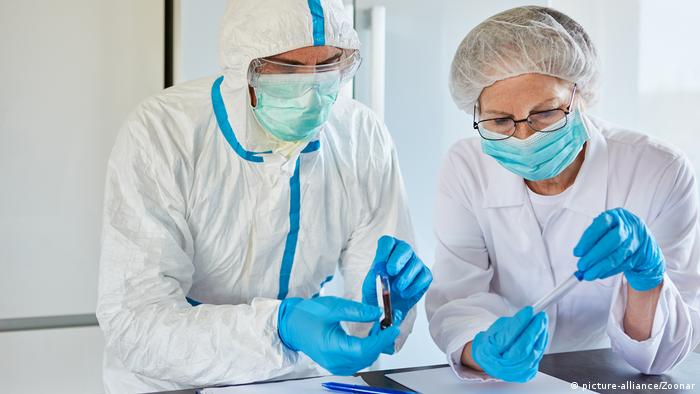Will coronavirus pandemic change Big Pharma's long-term focus?
Many leading pharmaceutical companies have focused on developing cancer medication. A fresh study by EY* looks at whether some may find virus research an even more lucrative business model in the future.

A study published by global consultancy EY on Monday shows that last year the bulk of the world's leading pharmaceutical companies focused on the development of anti-cancer drugs.
A total of 2,586 active agents were reported to be in the stage of clinical development, while "only" 605 anti-virus agents reached the same phase in 2019.
During the same time, cancer-related activities secured the biggest revenues for Big Pharma. Companies were able to boost their turnover by one-fifth last year to €174 billion ($196 billion), also driven by big blockbuster drugs generating revenues of at least $1 billion each.
Medication for the treatment of infections accounted for "only" €46 billion in revenues in 2019 marking a 5.1% increase in turnover year on year, EY notes.
"It's to be expected that research on infections and antibiotic resistance will move more into the focus of pharmaceutical companies going forward against the backdrop of the current coronavirus pandemic," says Siegfried Bialojan, head of the EY Life Science Center in Mannheim, Germany.
"At the same time, the largest pharmaceutical firms are unlikely to stop their long-term programs and will hardly focus solely on COVID-19." Bialojan says the reason for this is simple. "Pandemics are not predictable as a business factor, because you just don't know when and in which form they may occur."
M&A activities down
But COVID-19 has already had a different impact on the pharma sector. The EY study shows that many planned mergers and acquisitions (M&A) have been suspended. "Companies are playing for time and want to see what the situation will be like after the summer months," says Alexander Nuyken, EY's head of Life Science, Transaction Advisory for Europe, Middle East, India & Africa (EMEIA region).
"There are too many imponderables right now and too much insecurity, meaning that potential buyers and sellers really don't see eye to eye on the transaction price."
Nuyken adds, though, that in the long term pharmaceutical companies can learn a lot and profit from the current coronavirus crisis and rethink their in-house processes. He adds it's of utmost importance to increase the immediate availability and processing of health-related data "so as to ensure that we can better help patients and provide help more quickly."

Researchers the world over have been bending over backward to develop an effective vaccine to be used against COVID-19
The power of innovation
The life science segment has been able to unleash its full innovative potential in the current coronavirus crisis, EY notes. Within a very short time span it has managed to present over 160 potential vaccines and over 240 therapeutic active agents. EY also points to some 700 tests that Big Pharma had developed by the beginning of June this year — some of them have already been brought to market.
"There can be no doubt that for the company that wins the race for an approved anti-coronavirus vaccine, it'll be a game changer," says Nuyken. He warns, though, that there's still a long way to go and that there's no guarantee that a really safe and effective vaccine for all will be found in the end.
"We estimate that 97% of the vaccines being tested right now will not be approved, meaning that a lot of companies will just have burned big amounts of R&D money at the end of the day."
Investment drive before pandemic
EY points out that the world's largest pharmaceutical companies logged a marked uptick in investment activities in 2019, following a slump a year earlier.
The 21 biggest firms analyzed by the consultancy on aggregate increased their R&D investments by over 14% after an almost 2% dip in 2018. Earnings before interest and taxes (EBIT) rose by 11.9% last year — a solid improvement from the 3.2% in negative territory a year earlier.
Overall revenues in 2019 increased by 12.3%, with the biggest winner among those scrutinized being Takeda, which after its takeover of Shire booked revenues of €25.8 billion, while the year before it had bought in €15.6 billion.
Germany's top pharma companies were part of the success story. EY says Bayer's EBIT surged by a staggering 53% last year while Boehringer Ingelheim saw its pre-tax earnings rise by 31%. Merck logged a 28% improvement in EBIT earnings year on year.
"The year before the coronavirus struck was a positive one for the pharma industry," says Gerd Stürz, head of Life Sciences, Health and Chemicals for Germany, Switzerland and Austria at EY. He notes that companies' increased willingness to invest in innovation and flexible work processes in 2019 are now paying off in the current crisis.
Watch Video https://p.dw.com/p/3dlh5
Vaccine efforts a mix of competition and cooperation
Date 15.06.2020
Author Hardy Graupner
Related Subjects Coronavirus
Keywords pharmaceutical industry, big pharma, coronavirus, COVID-19, oncology, strategy, EY
Date 15.06.2020
Author Hardy Graupner
Related Subjects Coronavirus
Keywords pharmaceutical industry, big pharma, coronavirus, COVID-19, oncology, strategy, EY
*EY IS ACCOUNTING FIRM ERNST & YOUNG RE-BRANDED
No comments:
Post a Comment